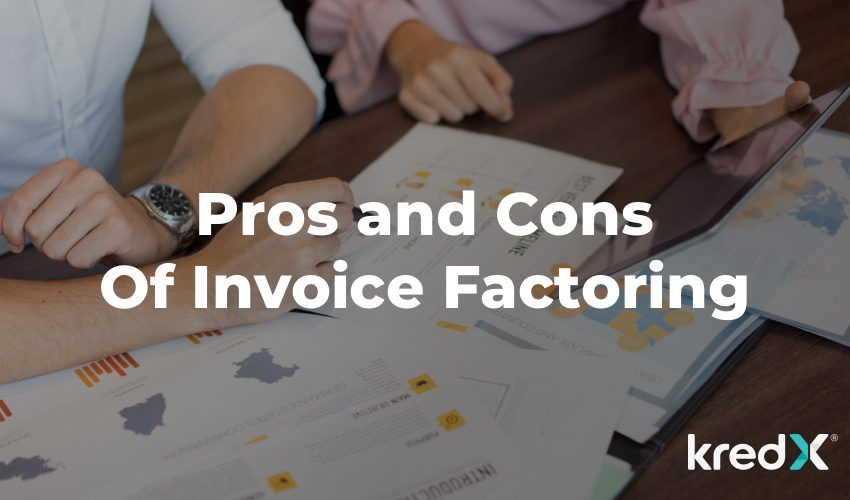
Pros and Cons of Invoice Factoring
Alternative financing options like invoice financing have made it easier for smaller businesses in India to access credit. This credit facility allows a business to use its unpaid invoices to meet its working capital requirements. Invoice financing can be categorised into two types, invoice factoring and invoice discounting.
Though they may seem similar, invoice factoring and discounting have multiple differences. This blog will explore important details of invoice discounting vs invoice factoring that would help readers get a clearer idea.
What Is Invoice Factoring?
Invoice Factoring is a short-term lending facility that enables businesses to access credit by selling unpaid invoices to a third-party lender. It doesn’t impact the business’s credit score because it is a sale and not a loan.
After a business sells off its invoices, the lender is responsible for processing and receiving payments directly from the customers. With invoice factoring, businesses can instantly avail 80% to 90% of the invoice amount (1). After an invoice factoring company receives the payment for the invoice, they’ll deduct the requisite fees and credit the excess amount to the borrower’s account.
What Is Invoice Discounting?
Invoice discounting is a short-term financing option that enables businesses to use unpaid invoices as collateral to avail loans from a third-party lender. After a business entity raises invoices for products or services, the invoice discounting company lends a percentage of the invoice amount after deducting a certain percentage.
After the business receives full payment from its customers, it needs to repay the loan and a stipulated fee to cover the interests, risks and costs.
KredX is India’s most reputed bill discounting service provider, which helps new businesses receive instant credit to solve their financial woes. It helps SMEs grow and expand and be at par with more established companies.
Pros and Cons of Invoice Factoring
Discussed below are the pros and cons of invoice factoring:
Pros
The following are some of the benefits of invoice factoring:
- Instant access to cash helps solve a cash crunch at the right time.
- No collateral is needed because this is an unsecured financing option.
- Easier to get approval compared to a traditional loan.
- Hassle-free documentation process.
Cons
The following are the disadvantages of opting for invoice factoring:
- While selling invoices, businesses relinquish every control to a third-party lender.
- If a customer fails to pay, the business will have to settle the bill.
- The average invoice factoring fees range from 1% to 5%, so it is an expensive financing option (2).
- It can affect a business’s customer relations if they do not prefer dealing with a third party.
Invoice Discounting Vs. Factoring
Let us take a glance at the differences between invoice discounting and factoring:
Criteria | Invoice Discounting | Invoice Factoring |
Confidentiality | Customers are not aware, and businesses are not required to inform customers that they have used invoice discounting services. | Businesses have to inform customers that they have accessed invoice factoring services, as customers have to pay directly to the third-party lender. |
Collection | It is the responsibility of the business (borrower) to collect payment from customers. | The responsibility of collecting payments lies with the third-party lender. |
Credit Control | The fintech service provider has no control over the sales ledger of the company. | The invoice factoring service provider has full control over the company’s ledger. |
Amount Raised | A business’s creditworthiness and accounts receivable determine the amount raised against invoices. | Businesses can raise to 90% of the invoice amount through invoice factoring. |
Suitable for | Big and medium-sized ventures. | Medium and small businesses. |
Bottom Line
There are multiple advantages and disadvantages of invoice factoring to be aware of. The important factors to consider when opting for this credit facility are the business’s nature, size, immediate capital requirement, and ability to optimise resources. Knowing the differences between invoice discounting vs invoice factoring is also essential to make an informed decision.



